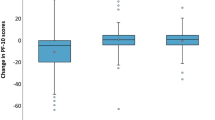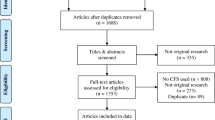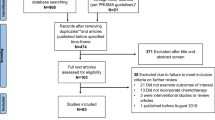Abstract
Purpose
Older patients with cancer may have an increased risk of early discontinuation of active treatment (ED), which results in poor outcome in curative or adjuvant settings. We aimed to determine the association between survival and ED and to identify predictors of ED in palliative setting.
Methods
Ninety-eight patients older than 65 years of age who received a comprehensive geriatric assessment (CGA) before palliative first-line chemotherapy were analyzed. Clinical information and CGA results were retrieved from electronic medical record. CGA included Charlson’s co-morbidity index, activities of daily living (ADL), instrumental ADL (IADL), Mini-Mental Status Examination, short-form of the geriatric depression scale, timed-get-up-and-go test (TGUG), and mini-nutritional assessment (MNA). ED was defined as no active cancer treatment (radiotherapy and/or chemotherapy) beyond palliative first-line chemotherapy. Predictors of ED were identified using clinical parameters and CGA.
Results
Active treatment was discontinued after first-line chemotherapy in 30 patients during median follow-up period of 15.1 months. ED after first-line chemotherapy was associated with shorter overall survival (OS; median OS = 3.1 vs. 14.7 months in patients with ED compared with patients without ED, p < 0.001). Eastern Cooperative Oncology Group performance status, living alone, ADL, IADL, MNA, and TGUG were associated with ED (p = 0.001, p = 0.048, p = 0.001, p < 0.001, p < 0.001, p = 0.002, respectively). In multivariable analysis, malnutrition and dependent IADL were the independent predictive factors for ED (odds ratio = 5.03; 95 % confidence interval = 1.50–16.87: odds ratio = 3.06; confidence interval = 1.03–9.12, respectively).
Conclusions
ED was associated with shorter OS in older patients with cancer. Malnutrition and dependent IADL were identified as independent predictive factors for ED.


Similar content being viewed by others
References
Kim YJ, Kim JH, Park MS et al (2007) Comprehensive geriatric assessment in Korean elderly cancer patients receiving chemotherapy. J Cancer Res Clin Oncol 137:839–847
Extermann M, Hurria A (2007) Comprehensive geriatric assessment for older patients with cancer. J Clin Oncol 25:1824–1831
Carreca I, Balducci L (2009) Cancer chemotherapy in the older cancer patient. Urol Oncol 27:633–642
Fried TR, Bradley EH, Towle VR, Allore H (2002) Understanding the treatment preferences of seriously ill patients. N Engl J Med 346:1061–1066
Goodwin JS, Zhang DD, Ostir GV (2004) Effect of depression on diagnosis, treatment, and survival of older women with breast cancer. J Am Geriatr Soc 52:106–111
Chrischilles EA, Link BK, Scott SD et al (2003) Factors associated with early termination of CHOP therapy and the impact on survival among patients with chemosensitive intermediate-grade non-Hodgkin's lymphoma. Cancer Control 10:396–403
Begg CB, Cohen JL, Ellerton J (1980) Are the elderly predisposed to toxicity from cancer chemotherapy? An investigation using data from the Eastern Cooperative Oncology Group. Cancer Clin Trials 3:369–374
Popescu RA, Norman A, Ross PJ et al (1999) Adjuvant or palliative chemotherapy for colorectal cancer in patients 70 years or older. J Clin Oncol 17:2412–2418
Sargent DJ, Goldberg RM, Jacobson SD et al (2001) A pooled analysis of adjuvant chemotherapy for resected colon cancer in elderly patients. N Engl J Med 345:1091–1097
Muss HB, Berry DA, Cirrincione C et al (2007) Toxicity of older and younger patients treated with adjuvant chemotherapy for node-positive breast cancer: the Cancer and Leukemia Group B Experience. J Clin Oncol 25:3699–3704
Wright J, Doan T, McBride R et al (2008) Variability in chemotherapy delivery for elderly women with advanced stage ovarian cancer and its impact on survival. Br J Cancer 98:1197–1203
Morris M, Platell C, Fritschi L, Iacopetta B (2007) Failure to complete adjuvant chemotherapy is associated with adverse survival in stage III colon cancer patients. Br J Cancer 96:701–707
Tracey L, O'Connor SBE, Kossoff EB, Groman A, Wilding GE, Ademuyiwa FO, Levine EG, Watroba N, Ngamphaiboonet al N (2012) Factors affecting the delivery of adjuvant/neoadjuvant chemotherapy in older women with breast cancer. J Geriatric Oncol 3:320–328
Wedding U, Höffken K (2003) Care of breast cancer in the elderly woman—what does comprehensive geriatric assessment (CGA) help? Support Care Cancer 11:769–774
Caillet P, Canoui-Poitrine F, Vouriot J et al (2011) Comprehensive geriatric assessment in the decision-making process in elderly patients with cancer: ELCAPA study. J Clin Oncol 29:3636–3642
Kanesvaran R, Li H, Koo KN, Poon D (2011) Analysis of prognostic factors of comprehensive geriatric assessment and development of a clinical scoring system in elderly Asian patients with cancer. J Clin Oncol 29:3620–3627
Repetto L, Fratino L, Audisio RA et al (2002) Comprehensive geriatric assessment adds information to Eastern Cooperative Oncology Group performance status in elderly cancer patients: an Italian Group for Geriatric Oncology Study. J Clin Oncol 20:494–502
Soubeyran P, Fonck M, Blanc-Bisson C et al (2012) Predictors of early death risk in older patients treated with first-line chemotherapy for cancer. J Clin Oncol 30:1829–1834
Extermann M, Boler I, Reich RR et al (2012) Predicting the risk of chemotherapy toxicity in older patients: the Chemotherapy Risk Assessment Scale for High-Age Patients (CRASH) score. Cancer 118:3377–3386
Hurria A, Togawa K, Mohile SG et al (2011) Predicting chemotherapy toxicity in older adults with cancer: a prospective multicenter study. J Clin Oncol 29:3457–3465
Mahoney FI, Barthel DW (1965) Functional evaluation: the Barthel Index. Md State Med J 14:61–65
Lawton MP, Brody EM (1969) Assessment of older people: self-maintaining and instrumental activities of daily living. Gerontologist 9:179–186
Podsiadlo D, Richardson S (1991) The timed "Up & Go": a test of basic functional mobility for frail elderly persons. J Am Geriatr Soc 39:142–148
Lee DY, Lee JH, Ju YS et al (2002) The prevalence of dementia in older people in an urban population of Korea: the Seoul study. J Am Geriatr Soc 50:1233–1239
Bae JN, Cho MJ (2004) Development of the Korean version of the Geriatric Depression Scale and its short form among elderly psychiatric patients. J Psychosom Res 57:297–305
Vellas B, Guigoz Y, Garry PJ et al (1999) The Mini Nutritional Assessment (MNA) and its use in grading the nutritional state of elderly patients. Nutrition 15:116–122
Charlson ME, Pompei P, Ales KL, MacKenzie CR (1987) A new method of classifying prognostic comorbidity in longitudinal studies: development and validation. J Chron Dis 40:373–383
Extermann M, Chen H, Cantor AB et al (2002) Predictors of tolerance to chemotherapy in older cancer patients: a prospective pilot study. Eur J Cancer 38:1466–1473
Hurria A, Zuckerman E, Panageas KS et al (2006) A prospective, longitudinal study of the functional status and quality of life of older patients with breast cancer receiving adjuvant chemotherapy. J Am Geriatr Soc 54:1119–1124
Extermann M, Albrand G, Chen H et al (2003) Are older French patients as willing as older American patients to undertake chemotherapy? J Clin Oncol 21:3214–3219
Bremnes RM, Andersen K, Wist EA (1995) Cancer patients, doctors and nurses vary in their willingness to undertake cancer chemotherapy. Eur J Cancer 31A:1955–1959
Griggs JJ, Culakova E, Sorbero ME et al (2007) Effect of patient socioeconomic status and body mass index on the quality of breast cancer adjuvant chemotherapy. J Clin Oncol 25:277–284
Griggs JJ, Sorbero ME, Stark AT et al (2003) Racial disparity in the dose and dose intensity of breast cancer adjuvant chemotherapy. Breast Cancer Res Treat 81:21–31
Smith K, Wray L, Klein-Cabral M et al (2005) Ethnic disparities in adjuvant chemotherapy for breast cancer are not caused by excess toxicity in black patients. Clin Breast Cancer 6:260–266
Shepherd FA, Dancey J, Ramlau R et al (2000) Prospective randomized trial of docetaxel versus best supportive care in patients with non-small-cell lung cancer previously treated with platinum-based chemotherapy. J Clin Oncol 18:2095–2103
Kang JH, Lee SI, Lim do H et al (2012) Salvage chemotherapy for pretreated gastric cancer: a randomized phase III trial comparing chemotherapy plus best supportive care with best supportive care alone. J Clin Oncol 30:1513–1518
Grothey A, Sargent D, Goldberg RM, Schmoll HJ (2004) Survival of patients with advanced colorectal cancer improves with the availability of fluorouracil-leucovorin, irinotecan, and oxaliplatin in the course of treatment. J Clin Oncol 22:1209–1214
McCusker J, Bellavance F, Cardin S et al (1999) Detection of older people at increased risk of adverse health outcomes after an emergency visit: the ISAR screening tool. J Am Geriatr Soc 47:1229–1237
Piccirillo JF, Tierney RM, Costas I et al (2004) Prognostic importance of comorbidity in a hospital-based cancer registry. JAMA 291:2441–2447
Read WL, Tierney RM, Page NC et al (2004) Differential prognostic impact of comorbidity. J Clin Oncol 22:3099–3103
Maione P, Perrone F, Gallo C et al (2005) Pretreatment quality of life and functional status assessment significantly predict survival of elderly patients with advanced non-small-cell lung cancer receiving chemotherapy: a prognostic analysis of the multicenter Italian lung cancer in the elderly study. J Clin Oncol 23:6865–6872
Janssen-Heijnen ML, Smulders S, Lemmens VE et al (2004) Effect of comorbidity on the treatment and prognosis of elderly patients with non-small cell lung cancer. Thorax 59:602–607
Peyrade F, Gastaud L, Ré D, Pacquelet-Cheli S, Thyss A (2012) Treatment decisions for elderly patients with haematological malignancies: a dilemma. Lancet Oncol 13:e344–e352
Winkelmann N, Petersen I, Kiehntopf M, Fricke HJ, Hochhaus A, Wedding U (2011) Results of comprehensive geriatric assessment effect survival in patients with malignant lymphoma. J Cancer Res Clin Oncol 137:733–738
Hoppe S, Rainfray M, Fonck M et al (2013) Functional decline in older patients with cancer receiving first-line chemotherapy. J Clin Oncol 23:2013. doi:10.1200/JCO.2012.47.7430
Acknowledgments
This study was supported by a grant from the National R&D Program for Cancer Control, Ministry for Health and Welfare, Republic of Korea (study no: 1320370).
Conflict of interest
No author reports a conflict of interest.
Author information
Authors and Affiliations
Corresponding author
Electronic supplementary material
Below is the link to the electronic supplementary material.
ESM 1
(DOCX 13 kb)
Rights and permissions
About this article
Cite this article
Kim, J.W., Kim, Y.J., Lee, KW. et al. The early discontinuation of palliative chemotherapy in older patients with cancer. Support Care Cancer 22, 773–781 (2014). https://doi.org/10.1007/s00520-013-2033-y
Received:
Accepted:
Published:
Issue Date:
DOI: https://doi.org/10.1007/s00520-013-2033-y




